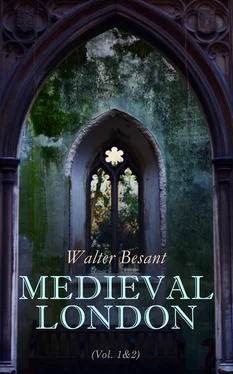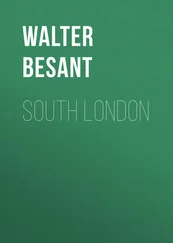Walter Besant
Medieval London (Vol. 1&2)
Historical, Social & Ecclesiastical (Complete Edition)
e-artnow, 2020
Contact: info@e-artnow.org
EAN 4064066310288
Volume 1 Volume 1 Table of Contents
Volume 2
Table of Contents Table of Contents Volume 1 Volume 1 Table of Contents Volume 2
PART I MEDIÆVAL SOVEREIGNS PART I MEDIÆVAL SOVEREIGNS Table of Contents
CHAPTER I HENRY II
CHAPTER II RICHARD I
CHAPTER III JOHN
CHAPTER IV HENRY III
CHAPTER V EDWARD I
CHAPTER VI EDWARD II
CHAPTER VII EDWARD III
CHAPTER VIII RICHARD II
CHAPTER IX HENRY IV
CHAPTER X HENRY V
CHAPTER XI HENRY VI
CHAPTER XII EDWARD IV
CHAPTER XIII RICHARD III
PART II SOCIAL AND GENERAL
CHAPTER I GENERAL VIEW
CHAPTER II PORT AND TRADE OF LONDON
CHAPTER III TRADE AND GENTILITY
CHAPTER IV THE STREETS
CHAPTER V THE BUILDINGS
CHAPTER VI FURNITURE
CHAPTER VII WEALTH AND STATE OF NOBLES AND CITIZENS
CHAPTER VIII MANNERS AND CUSTOMS
CHAPTER IX FOOD
CHAPTER X SPORT AND RECREATION
CHAPTER XI LITERATURE AND SCIENCE IN LONDON
CHAPTER XII FIRE, PLAGUE, AND FAMINE
CHAPTER XIII CRIME AND PUNISHMENT
CHAPTER XIV CHRISTIAN NAMES AND SURNAMES
APPENDICES
APPENDIX I WYCLYF
APPENDIX II TRADES OF LONDON
APPENDIX III FOREIGN MERCHANTS
APPENDIX IV NAMES OF STREETS
APPENDIX V
APPENDIX VI THE SHOP
APPENDIX VII THE ASSIZE OF BUILDING
APPENDIX VIII RULES CONCERNING LAWYERS
APPENDIX IX I APPEND A LIST OF MEDIÆVAL SURNAMES COMPILED FROM THE USUAL AUTHORITIES
FOOTNOTES:
PART I
MEDIÆVAL SOVEREIGNS
Table of Contents
Table of Contents
[In considering the reigning Kings in order, I have found it necessary to reserve for the chapters on the Mediæval Government of the City the Charters successively granted to the Citizens, and their meaning.]

HENRY II. (1133-1189)
From his effigy at Fontevrault.
The accession of the young King, then only three-and-twenty years of age, brought to the City as well as to the Country, a welcome period of rest and peace and prosperity. These precious gifts were secured by the ceaseless watchfulness of the King, whose itinerary shows that he was a most unwearied traveller, with a determined purpose and a bulldog tenacity. From the outset he gave the whole nation, barons and burgesses, to understand that he meant to be King. To begin with, he ordered all aliens to depart. The land and the City were full of them; they were known by their gait as well as their speech; the good people of London looked about the streets, the day after the proclamation of exile, for these unwelcome guests, whose violence they had endured so long. They were gone “as though they had been phantoms,” Holinshed writes. During his long reign, 1154-1189, Henry, who seldom stayed in one place more than a few days, was in London or Westminster on twenty-seven occasions, but in many of them for a day or two only. These occasions were in March 1155; in April 1157; in March, July, and October 1163; in April and September 1164; in September and October 1165; in April and June 1170; in July 1174; in May, August, and October 1175; in March and May 1176; in March and April 1177; in July 1178; in August, November, and December 1186; in March 1185; in June 1186, and in June 1188. And all these visits together amounted to less than three months in thirty-five years. We may note that Henry held his first Christmas at Bermondsey, not at Westminster. One asks in vain what reason there was for holding the Court at a monastic house in the middle of a marsh, much more difficult of access than that of Westminster. It was here that it was decided that the Flemings, who had flocked over during the last reign, should leave the country. Among them was William of Ypres whom Stephen had made Earl of Kent. We hear very little of the King’s personal relations with the citizens, by whom he was respected as befits one of whom it is written that he was “pitiful to the poor, liberal to all men, that he took of his subjects but seldom times any great tributes, and, further, that he was careful above all things to have the laws duly executed and justice uprightly administered on all hands.”
In the year 1170 Henry II. had his eldest son Henry crowned King; but the “Young King,” as he was called, never lived to occupy his father’s place; after a career of rebellion he died of a fever in 1183.
Henry’s Charter gave the citizens privileges and liberties as large as those granted by Henry I.—with one or two important exceptions. The opening clause in the former Charter was as follows:—
“Know ye that I have granted to my citizens of London to hold Middlesex to farm for three hundred pounds upon accompt to them and their heirs: so that the said citizens shall place as sheriff whomsoever they will of themselves: and as Justiciar whomsoever they will of themselves, for keeping of the pleas of the crown, and of the pleadings of the same, and none other shall be justice over the same men of London.”
Except for a few years in the twelfth century the sheriffs were always elected by the Crown. In the reign of Stephen the citizens are said to have bought the right of electing their sheriffs. The omission of so important a clause indicates the policy of the King. It was his intention to bring the City under the direct supervision of the Crown. He therefore retained the appointment of the sheriff in his own hands; he calls him “my sheriff,” meus Vicecomes; and it was so kept by himself and his successor Richard the First. When John restored to the City the election of the sheriff, the post had lost much of its importance because the communal system of municipal government had been introduced under a mayor. Thanks mainly to the strong hand of the King, who enforced peace and order throughout the country, the prosperity of London greatly increased during his reign. As yet the City was governed by its aristocracy, the aldermen of the wards, which were at first manors or private estates. They endeavoured to rule the City as a baron ruled his people each in his own ward: there was, however, the Folk Mote to be reckoned with. The people understood what was meant by meeting and by open discussion: the right of combination was but a corollary.
It is at this time that we first hear of the licences of guilds. We may take it as a sign of prosperity when men of the same craft begin to unite themselves into corporate bodies, and to form rules for the common interest.
In the year 1180 it is recorded that a number of Guilds formed without licence were fined:—
“The Gild whereof Gosceline was Alderman or President, thirty marks; Gilda Aurifabrorum, or Goldsmiths, Radulphus Flael, Alderman, forty-five marks; Gilda de Holiwell, Henry son of Godr. Alderman, twenty shillings; Gilda Bocheiorum, William la Feite, Alderman, one mark; Gilda de Ponte Thomas Cocus, Alderman, one mark; Gilda Piperariorum, Edward——, Alderman, sixteen marks; Gilda de Ponte, Alwin Fink, Alderman, fifteen marks; Gilda Panariorum, John Maurus, Alderman, one mark; Robert Rochefolet, his Gild, one mark; Richard Thedr. Feltrarius, Alderman, two marks; Gilda de Sancto Lazaro, Radulph de Barre, Alderman, twenty-five marks; Gilda de Ponte, Robert de Bosio, Alderman, ten marks; Gilda Peregrinorum, Warner le Turner, Alderman, forty shillings; Odo Vigil, Alderman, his Gild, one mark; Hugo Leo, Alderman, his Gild, one mark; and Gilda de Ponte, Peter, son of Alan, Alderman, fifteen marks.” (Maitland, vol. i. p. 53.)
Читать дальше













